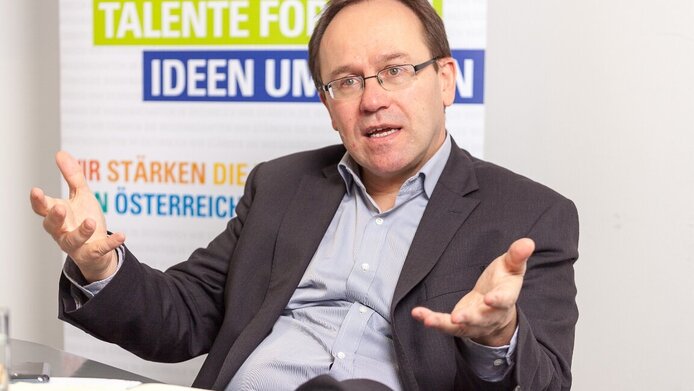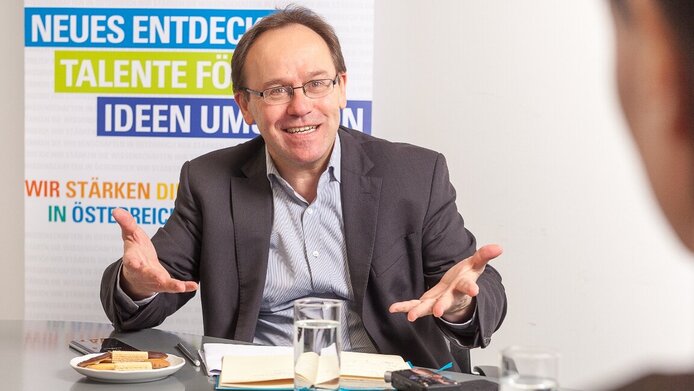“We need to confront competition”

FWF: What summary would you draw of your first 100 days in office as the President of the Austrian Science Fund FWF? Klement Tockner: Three crucial things happened in these first months. First, the FWF was promised more than 50% additional funding through to 2021. Many people have been advocating such a move for a long time. At the same time, we have established a basis of trust at the FWF on which we will build. Second, we have developed an ambitious strategy paper and presented it to the general public. And third, we have started a quality offensive regarding our reviewing and selection processes. Now we have to implement all of this swiftly. FWF: The themes of the strategy paper for the period 2017 to 2020 cover a broad range, from research alliances to supporting high-potential scholars by creating ‘future chairs’ for them, but also internationalisation. Which project is the most important for you? Tockner: It is certainly a priority objective to see more funds allocated to the competitive field, because Austria’s innovation potential hinges on that. – In order to do this, we urgently need to strengthen the FWF, and for such a reinforcement to be justifiable the central need is to keep developing the quality. As a custodian of basic research, the FWF has to fulfil a model function. Beyond that, we also want to be pioneers by exploring new avenues of research funding in order to pave the way for sustainable economic and social development.
FWF: The promised increase in the FWF’s budget will amount to EUR 281 million for the period from 2018 until 2021. This is not enough to implement all the projects in the pipeline. What are the priorities and how do you intend to fund the rest of the initiatives? Tockner: Part of the budget increase is designed to give a strong boost to the domain of high-risk research. To cater to this domain we have developed the ‘1,000 Ideas Programme’, which is set to foster blue-sky research ideas and approaches of high scientific and social relevance. Project-linked overhead cost is another important point, if we want to provide additional support to research institutions, supporting them to focus on their priority areas. We hope that the additional funds can cover at least part of the related costs. Another part may be coming from structural funds made available to the universities. However, the highest priority is the support of scholars who get excellent reviews but cannot currently get a grant for budgetary reasons. This will make it possible for some 1,400 additional people in the scientific field to be engaged in FWF-funded projects each year.
FWF: All the other endeavours such as the ‘future chairs’ would then have to wait? Tockner: It is our aim to create 200 additional tenure-track professorships in the next eight years within the context of an excellence program. This is designed to give internationally outstanding young scholars new career perspectives, of which there is decidedly a lack right now. Furthermore, it would send out an important signal as it would give a strong boost to the science landscape of Austria and give it an even higher international profile. We have come forward with this proposal, and together with the scientific community we will discuss its implementation. I could imagine that we launch the first thematic tender in educational research in 2017 or 2018, for example with the support of the newly set-up Innovationsstiftung für Bildung (Foundation for Innovation in Education). FWF: So far, the FWF has been pursuing a bottom-up approach in funding research. Is this going to change now? Tockner: Both must be possible. We are going to set certain themes and then open them up to free competition in a bottom-up approach. This is what already happens, for instance, in transnational European funding programmes. That said, it is going to be a challenge to deal with a combination of bottom-up and top-down approaches. Fair, transparent competition, with external quality assurance, is the essential standard we pursue. That also means that funds will be allocated on an even more competitive basis. We want to design the content and the strategies for this competition in cooperation with the research institutions and partly with other funding bodies, in order to increase quality and make Austria an even more attractive research location.
FWF: Competition and cooperation: how do the two go together? Tockner: Let’s take the example of the excellence programme, which is going to be the framework for the ‘future chairs’: it would be strongly geared to the universities and research institutions. In order to ensure fair competition, however, it is vital for such a programme to be organised and implemented by a central, independent funding body such as the FWF. In terms of content, it might be necessary to identify strategic and thematic focus areas. It would be anything but helpful for Austria, if every field either had its own funding budget or would like to have it. FWF: The support offered by the FWF targets scholars at different stages in their careers. Right now we are still confronted with the dilemma that there are not enough attractive posts and research settings in Austria. Will the FWF thus be contributing to a brain drain of highly qualified scholars to other countries? Tockner: As a matter of principle, I have no problem with that. Scholars need to be mobile, and they are always acting in global competition. Like everybody else, we would like to get the best people, no matter where they come from. Quite the contrary, research is diverse, which usually means the more international, the more successful and rewarding. I could have seen myself based in Zagreb or Madrid just as easily. What counts is the opportunity to shape your work! Therefore we need to create conditions that are so attractive that we can keep up with other venues. By the way, half the Schrödinger Fellows (author’s note: an FWF mobility programme) are offered a professorial chair somewhere in the world within the first 10 years thereafter. That is an absolute success story.
FWF: Critics say that there is too much funding of mainstream research. Does the Austrian grant system invest in the right themes and fields? Tockner: We are certainly not always courageous enough to support the truly innovative projects. This is why we have developed the ‘1,000 Ideas Programme’. – Another vital aspect is research overarching disciplines and institutions: For example, by linking up the humanities and social sciences more strongly with the natural sciences. Cooperation between engineering and natural sciences is also a largely unexplored field. This boundary between basic research and application-oriented research is going to disappear in the future. The question is how we can create a culture that will foster such openness and permeability. FWF: Recently, the first Austrian chair for science communication was set up. Where do you see science communication in Austria? Tockner: The frequently cited ‘ivory tower’ still exists, of course, it is just inhabited by more people now. Not unlike the debates at political level we are currently seeing, there is also a discussion in science between the ‘elite’ and the community at large. We need to be watchful and counteract such a possible polarisation. Dialogue always needs to be given pride of place. Pure science marketing is certainly not sufficient to achieve that. What is central is to involve the citizens, as in citizen science projects, although the focus absolutely needs to stay on the generation of knowledge. As a matter of principle, the aspect of knowledge transfer needs to be more strongly rooted in the system. In the US, for instance, scientists are trained to seek active involvement in societal debate.
FWF: What is the role of the scientist in society? Tockner: It is the primordial task of the scholar to be an ‘honest broker’ who produces evidence-based knowledge and makes it generally available. Take me: I am an ecologist, not a nature protectionist or a member of an NGO; as a scholar it is not my place to put labels such as ‘good’ or ‘bad’ on things. This is for society to decide. A scientist, however, needs to point out potential consequences and different options. I could well imagine though a rewarding cooperation with investigative journalists. In some way, the work of scientists is also investigative. A support programme that assists journalists to devote themselves fully to a specific topic for half a year might be an exciting idea. It’s always important to keep a long-term goal in mind, instead of merely chasing any trends. FWF: You are an aquatic ecologist. When and how did you discover your passion for science? Tockner: I wouldn’t put it that way. Perhaps I have just managed to avoid some things that could have killed off my curiosity and playfulness, as, I regret to say, can so easily happen in education and at school. Actually, we are all born as scientists; children are natural-born explorers. But in order to nurture this spirit of exploration one needs breathing space. It is difficult to instil people with curiosity and enthusiasm later on in life, and therefore we need to avoid them being deprived of these qualities in the first place. FWF: What induced you to give up a position as a top researcher and devote yourself fully to the science system? Tockner: This is a question I have often been asked, because I had a privileged tenured position as the head of a successful university department in Berlin. But being sated and content is not at all sufficient. In science, the opposite is true. The crux is how to keep yourself and your team “hungry” in a positive sense of the term. One way of achieving that is by confronting a new challenge which also involves facing a certain level of insecurity. Although widespread, the yearning to be covered against any risk is not a good state of mind, it’s not going to make us advance. Ultimately, what counts is actively shaping the world and assuming responsibility for society in particular.
Klement Tockner studied zoology and botany at the University of Vienna. Tockner was the head of a research group at the Swiss Eawag, an aquatic research institute within the ETH Zürich, for 10 years before moving to Berlin to assume leadership of the Leibniz Institute of Freshwater Ecology and Inland Fisheries (IGB) in 2007. He is also Professor for Aquatic Ecology at the Freie Universität Berlin. In September 2016, Tockner was appointed President of the Austrian Science Fund FWF.
Further reading






